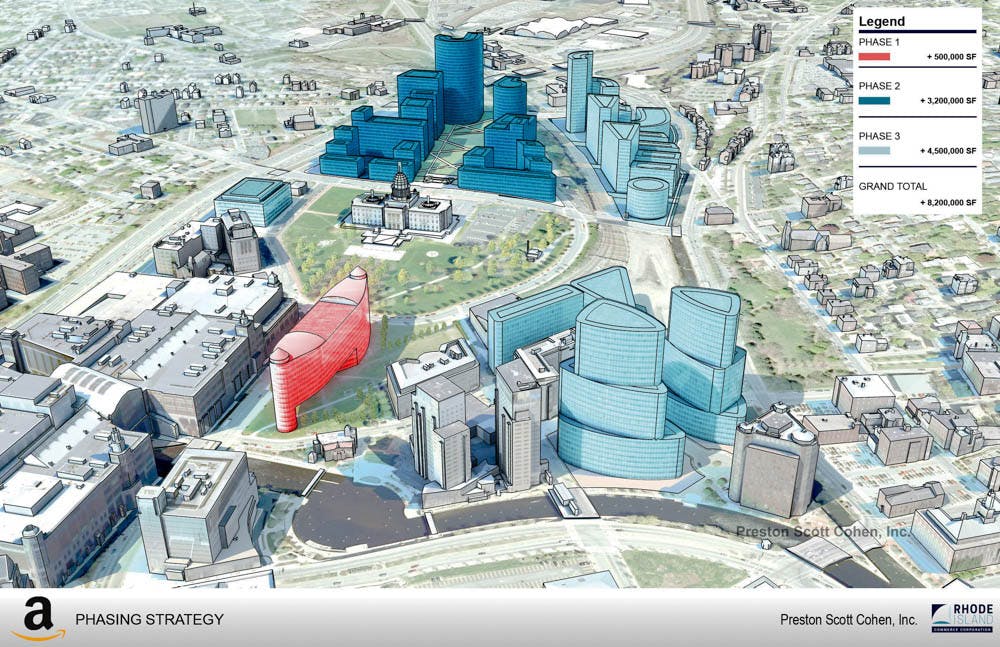In under seven weeks, the state of Rhode Island managed to put together a competitive proposal for Amazon’s second North American headquarters, following the tech giant’s call for applications Sept. 7. The proposal — submitted Oct. 19 and one of 238 total that Amazon received — outlined potential plans for a headquarters located in one of seven possible cities across Rhode Island, including Providence and Woonsocket.
“Our application package lays out the partnerships, business climate, quality of life and incentives that make Rhode Island attractive — and make our proposal competitive,” said R.I. Secretary of Commerce Stefan Pryor in a press release.
Amazon projects that the site of its next headquarters will receive over $5 billion in direct investments and close to $40 billion in indirect investments, based on investments since 2010 in its first headquarters in Seattle, according to its website. The company also estimates that the new headquarters will include 50,000 high-paying jobs.
“All the anchor institutions, cities and towns — everybody came together and put together one shining bid,” said Tom Giordano, executive director of the non-profit Partnership for R.I., a coalition of 12 local businesses, including the University. “You don’t really see that happen in too many places.”
In its contribution to the Amazon proposal, the University helped develop the concept for an “Amazon Academy,” a direct response to Amazon’s request for an affiliated higher education program. Rhode Island’s universities would collaborate to develop special opportunities for Amazon employees.
“This would be a talent development partnership,” said Brian Clark, University spokesperson. “Amazon would need access to employment and training” that the University could provide in order to keep potential Amazon employees “up to date with the knowledge needed for the workplace.”
Clark emphasized that employees in Amazon Academy might be drawn especially to the University’s School of Professional Studies master’s programs, the executive MBA program, the new data science initiative and the computer science program. The company’s presence could also benefit undergraduate students through potential internships and research opportunities, he added.
Matt Sheaff, communications director for R.I. Commerce Corporation, stated that “no new public money” was spent on the campaign. It relied primarily on the local ad firm Nail, which was already on retainer by R.I. Commerce Corporation.
However, Partnership for R.I. and its affiliated organizations invested in the proposal by producing marketing videos, funding architectural renderings from two different design firms and bringing together CEOs from leading R.I. companies like Hasbro and Blue Cross Blue Shield to offer testimonials, Giordano said. According to a source involved in the campaign, the Partnership for R.I. contributed between $50,000 and $150,000 in services to bolster the state’s proposal.
“Amazon would be a good community partner,” said Neil Steinberg ’75, CEO of Rhode Island Foundation and co-founder of Partnership for R.I. “You could have Amazon people here who could serve on boards, be involved in philanthropic efforts — whether in social services or the arts — and you could have many individuals and executives who could be part of the community fabric.”
Though Steinberg and others acknowledge that many of the other cities submitting proposals, such as Pittsburgh or Atlanta, are considerably larger than Providence or any other R.I. city, they emphasize that the state’s small size does come with some advantages.
“In a lot of other areas, Amazon would be competing directly with numerous other big companies,” said Barrett Hazeltine, professor emeritus of engineering. “But in Rhode Island there is a lot of space — It’s underused. And in Rhode Island, Amazon would really be king of the hill.”
Providence, in particular, has a strong transportation system in place that could be extremely useful to Amazon, with T.F. Green Airport, Amtrak and a major highway all located nearby, Hazeltine added.
Another key facet of Rhode Island’s application included a series of architectural designs for the new headquarters. Preston Scott Cohen, an architect involved in the campaign, developed potential plans for a headquarters in the vicinity of the state capitol and championed Providence’s unique urban layout as an ideal location for Amazon.
“In Providence, five things converge,” Cohen said. “There is the state house, the transportation hub of the train station, the downtown as a very clear and centralized and beautifully composed entity, the hills of the adjacent neighborhoods bringing a wonderful pedestrian environment and, finally, the close proximity of Brown, RISD and other universities.”
Even if the state’s bid for Amazon fails, Steinberg said the marketing campaign could still draw other companies or future investment from Amazon.
In the last 20 months, the Ocean State has had a surge in business growth with 20 global companies expanding or establishing headquarters in Rhode Island, according to R.I. Commerce Corporation. And while Rhode Island lost out to Boston last year for General Electric’s new headquarters, GE decided to establish a digital division in Providence soon after.
“In a short amount of time, we got the right people around a table to make a best effort pitch for (Rhode Island),” Steinberg said. “The state mobilized very well in gathering together its financial, human and technical resources to put Rhode Island’s best foot forward.”





